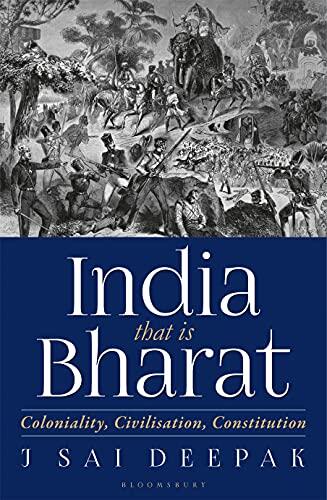
India that is Bharat: Coloniality, Civilisation, Constitution
بواسطة
J. Sai Deepak
لا توجد تقييمات بعد
Religion & Spirituality
Science & Technology
History
تنسيق
غلاف صلب
صفحات
484
لغة
الإنجليزية
منشور
Aug 15, 2021
الناشر
Bloomsbury India
رقم ISBN-10
9354352499
رقم ISBN-13
9789354352492
الوصف
This thought-provoking exploration delves into the intricate relationships between colonial history, cultural identity, and constitutional principles in India. The author, J Sai Deepak, meticulously examines how India's colonial legacy has shaped its modern identity and governance. By intricately weaving together historical narratives and contemporary issues, the work provides readers with a comprehensive understanding of what defines India today.
Deepak challenges prevailing narratives by questioning the impacts of colonialism on the essence of Indian civilization. He argues that the country's rich heritage has often been overshadowed by a Western-centric perspective, which fails to acknowledge its unique philosophical and cultural paradigms. His analysis encourages readers to reconsider their interpretations of Indian identity, urging a re-engagement with indigenous concepts that have influenced the nation's trajectory.
The discussion also extends to the constitutional framework, portraying it as more than just a legal document but as a living embodiment of the country's ethos. Through this lens, Deepak invites a dialogue about how constitutional values align—or clash—with India's historical and civilizational context.
With eloquence and rigor, this work seeks to inspire critical reflection among its readers, prompting them to appreciate the complexities that shape India. By addressing fundamental questions regarding identity, legacy, and governance, the author offers a nuanced perspective that resonates with those interested in the ongoing discourse surrounding India's past and future.
Deepak challenges prevailing narratives by questioning the impacts of colonialism on the essence of Indian civilization. He argues that the country's rich heritage has often been overshadowed by a Western-centric perspective, which fails to acknowledge its unique philosophical and cultural paradigms. His analysis encourages readers to reconsider their interpretations of Indian identity, urging a re-engagement with indigenous concepts that have influenced the nation's trajectory.
The discussion also extends to the constitutional framework, portraying it as more than just a legal document but as a living embodiment of the country's ethos. Through this lens, Deepak invites a dialogue about how constitutional values align—or clash—with India's historical and civilizational context.
With eloquence and rigor, this work seeks to inspire critical reflection among its readers, prompting them to appreciate the complexities that shape India. By addressing fundamental questions regarding identity, legacy, and governance, the author offers a nuanced perspective that resonates with those interested in the ongoing discourse surrounding India's past and future.